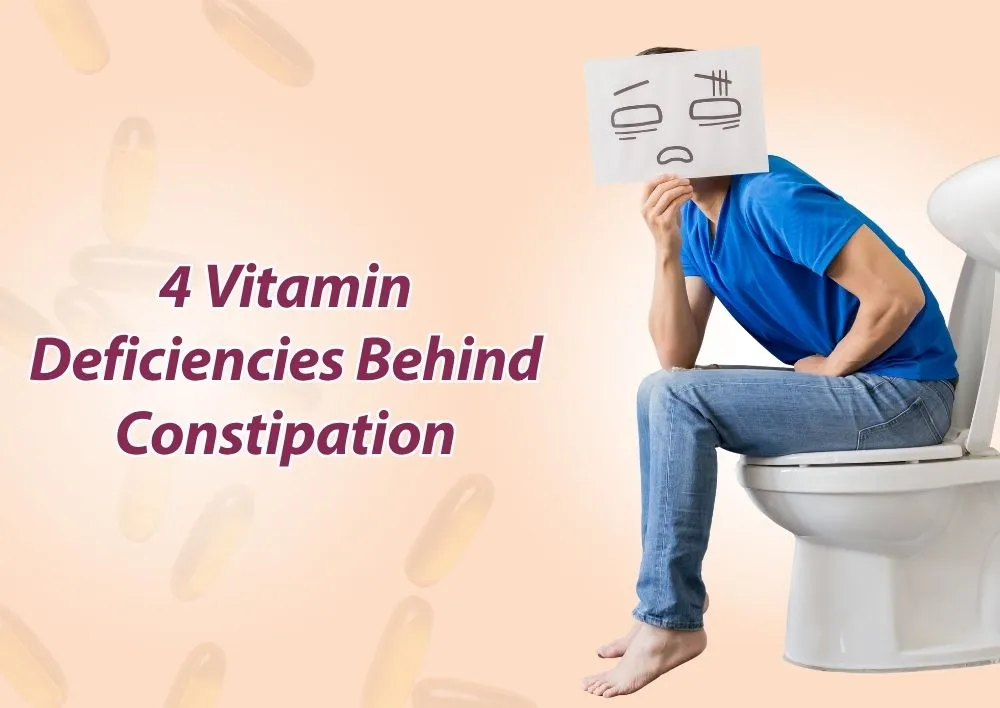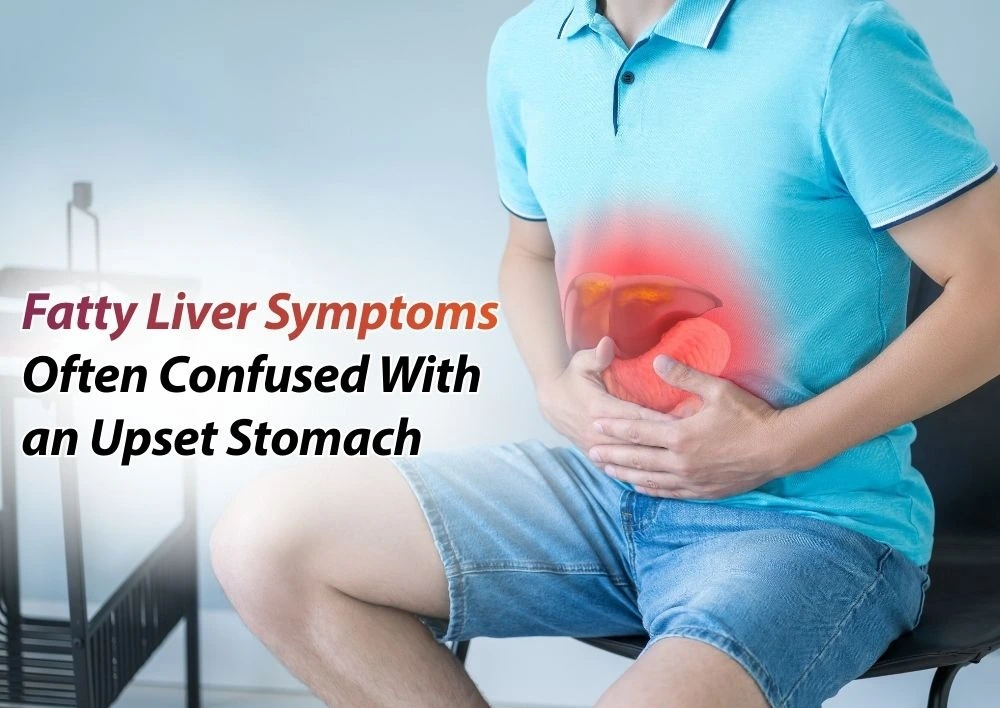Top 4 Vitamin Deficiencies Behind Constipation
Summary
Overview:
Feeling bloated, uncomfortable, or struggling to have a smooth bowel movement? Constipation can slow down your entire day, and surprisingly, your vitamins might be the hidden reason behind it. Most people blame low water intake or lack of fiber, but vitamin deficiencies are a silent trigger that often gets ignored. Vitamins help your digestion run smoothly, support gut health, and keep your intestinal muscles functioning properly. When even one of these nutrients drops, your tummy shows its displeasure, often in the form of constipation.
Before we explore the main list, let’s understand the link between vitamins and your digestive health.
Vitamin Deficiency and Constipation
Your digestive system needs the right balance of vitamins to keep your intestines moving, soften stool, and support gut-friendly bacteria.
A deficiency in essential vitamins can:
-
Slow down muscle movement in the intestines
-
Harden the stool
-
Reduce digestive enzyme production
-
Affect nerve activity in the gut
-
Disrupt the microbiome
According to Dr. Deepanshu Khanna, Renowned Gastroenterologist in Gurgaon, Miracles Mediclinic, "Most people don’t realize that constipation isn’t always about low fiber. Even mild vitamin deficiencies can weaken the intestinal muscles and disturb gut function. Correcting these deficiencies often brings significant relief without the need for strong medicines."
This combination of low vitamins and poor gut activity often leads to sluggish digestion, bloating, and constipation.
Now, let's explore the exact vitamins responsible.
1. Vitamin B12 Deficiency
Vitamin B12 is important for a healthy nervous system, energy production, and proper digestive function. If your body doesn’t produce enough stomach acid or intrinsic factor, B12 absorption drops, and your digestive muscles become weaker, slowing down bowel movement.
How B12 Deficiency Leads to Constipation
-
Weakens digestive muscles
-
Slows intestinal movement
-
Causes bloating, indigestion, and gas
Other Symptoms of B12 Deficiency
-
Fatigue
-
Mouth ulcers
-
Tingling or numbness
-
Memory issues
-
Pale skin
B12-Rich Foods
-
Eggs
-
Milk & dairy products
-
Chicken & fish
-
Fortified cereals
People following vegetarian or vegan diets are at a higher risk of deficiency, making supplements important when prescribed.
2. Vitamin D Deficiency
Vitamin D does much more than protect your bones. It helps maintain healthy gut nerves and muscles, ensuring your intestines move food smoothly forward.
A drop in Vitamin D can disturb gut bacteria and lead to sluggish digestion and constipation.
Why Low Vitamin D Causes Constipation
-
Reduces muscle strength in the intestines
-
Disrupts healthy gut bacteria
-
May contribute to IBS-related constipation
Other Symptoms of Vitamin D Deficiency
-
Tiredness
-
Muscle cramps
-
Low immunity
-
Mood changes
-
Bone pain
Healthy Sources of Vitamin D
-
Early morning sunlight (10–20 minutes)
-
Milk, yogurt, cheese
-
Eggs
-
Fatty fish
-
Supplements if prescribed
Correcting Vitamin D levels often improves bowel habits naturally.
3. Vitamin C Deficiency
Vitamin C acts as a natural stool softener because it increases water absorption in the intestines. When Vitamin C levels drop, the stool becomes harder, drier, and more difficult to pass, leading to constipation.
How Vitamin C Deficiency Causes Constipation
-
Reduces water content in stools
-
Affects collagen production in the intestines
-
Slows digestive movement
Other Signs of Vitamin C Deficiency
-
Frequent infections
-
Dry or rough skin
-
Slow wound healing
-
Bleeding gums
-
Fatigue
Vitamin C-Rich Foods
-
Oranges
-
Lemon
-
Amla
-
Kiwi
-
Tomatoes
-
Bell peppers
Adding just two Vitamin C–rich fruits per day can significantly improve digestion.
4. Vitamin B1 (Thiamine) Deficiency
Vitamin B1 helps convert food into energy and supports nerve functioning, including nerves that control your intestines. Low levels of B1 can weaken intestinal muscle activity and cause slow bowel movement and constipation.
How Vitamin B1 Deficiency Leads to Constipation
-
Slows metabolism
-
Weakens gut muscles
-
Affects nerve signals in the intestines
Other Symptoms
-
Loss of appetite
-
Feeling tired
-
Irritability
-
Muscle weakness
Thiamine-Rich Foods
-
Whole grains
-
Beans and lentils
-
Nuts and seeds
-
Meat and eggs
Though rare, this deficiency can worsen chronic constipation if ignored.
How Common Are These Vitamin Deficiencies?
These deficiencies are more common than you think. Modern lifestyle and dietary habits reduce vitamin levels. Some major contributors include:
-
Limited sunlight exposure
-
Poor nutrient absorption
-
Strict vegetarian or vegan diets
-
High caffeine or junk food intake
-
Certain medications
-
Skipping meals
If constipation is recurring, checking your vitamin levels is a smart first step.
How to Prevent Constipation?
Here are simple and effective ways to support your digestive health naturally:
-
Eat a balanced diet: Include fresh fruits, vegetables, whole grains, dairy, and lean proteins.
-
Increase fiber intake: Choose oats, chia seeds, leafy greens, fruits, and beans.
-
Stay hydrated: Drink at least 6–8 glasses of water daily.
-
Get sunlight daily: 10–20 minutes of morning sunlight can boost Vitamin D naturally.
-
Add probiotics: Consume yogurt, buttermilk, and fermented foods to keep your gut healthy.
-
Exercise regularly: Even a short walk helps stimulate bowel movement.
-
Take supplements only when advised: Always consult a gastroenterologist before starting any supplement.
When Should You See a Doctor?
Consult a healthcare expert if you experience:
-
Constipation lasting longer than 3 weeks
-
Blood in stools
-
Severe abdominal pain
-
Unexplained weight loss
-
Persistent bloating or discomfort
Chronic constipation may indicate an underlying digestive or metabolic condition.
Conclusion:
Constipation can be uncomfortable, but identifying the root cause makes it easier to manage. Vitamin deficiencies, especially B12, D, C, and B1, play an important role in digestive health. Correcting these levels through diet, lifestyle changes, and medical advice can significantly improve your bowel movements and overall well-being. Need help managing constipation or digestive issues? Get expert evaluation and the right treatment from experienced doctors. Book your consultation with a gastroenterologist near you at Miracles Healthcare today for constipation treatment and improve your gut health naturally!
Frequently Asked Questions
Deficiencies in Vitamin B12, Vitamin D, Vitamin C, and Vitamin B1 can slow gut movement and lead to constipation.
Vitamin C helps soften stool, while Vitamin D and B vitamins support healthy gut muscles and improve bowel movement.
You may be low in fiber, water, or key vitamins like B12, D, C, or B1, all of which affect digestion and stool consistency.
Yes, excessive Vitamin D can raise calcium levels, which may sometimes lead to constipation and dehydration.








.webp)







Was the information useful?
15 0